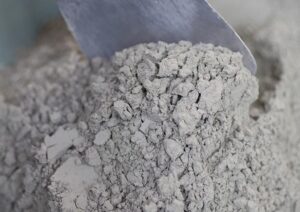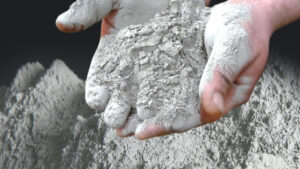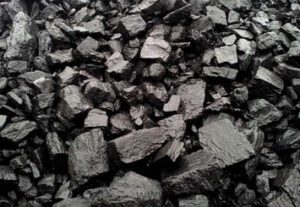
Cement consumption in the domestic Ukrainian market in 2023, which increased by 17% compared to 2022 and reached 5.4 million tons, will continue to grow moderately, according to Pavlo Kachur, chairman of the Ukrcement Association.
“Even in a state of war, we have undergone some adaptation. If 2022 was a shock year, and our cement consumption dropped to 4.6 million tons of cement per year against 10.5 million tons the previous year, in 2023 we adapted to the situation and reached 5.4 million tons. I think this is a good growth for wartime. I don’t think there will be such a jump in 2024, but we will probably reach 6 million tons of domestic cement consumption,” Kachur said at the roundtable discussion “Building Materials. Preparedness for Market Needs for Recovery” at Interfax-Ukraine on Tuesday.
In addition, at the end of 2023, exports amounted to 1.24 million tons of cement, while imports amounted to 23 thousand tons of special cements that are not produced in the country.
According to Kachur, the potential for cement production by enterprises in Ukraine today is 13.6 million tons of cement, while current financial and human resources provide for consumption of 12.5 million tons. Despite the ability of Ukrainian companies to fully cover the market’s needs, it makes sense to plan to expand production, he said.
“We are also preparing for other options. Processes may overlap, and one of them may be the negotiation process with the European Union. If it is successful, European infrastructure projects may also take place during the recovery period. This may lead to increased cement consumption, and we must be prepared for this,” said the head of Ukrcement.
The expert noted that production could be increased in three stages: the construction of new clinker kilns and capacity expansion, the restoration of plants in Balakliya and Kramatorsk, and the construction of new cement plants. The two companies are already considering the construction of two new clinker kilns, which will increase their cement production capacity by 2.4 million tons, but the construction will be launched after they reach the consumption level of 10.5 million tons of cement.
Kachur also emphasized the importance of localizing production in the recovery prospects and protecting the Ukrainian market.
“I support the thesis of maximum localization. This is the only way for Ukraine’s economy to develop. But it is also important to protect our market. We realize that the countries that are donors of funds for the recovery can also supply construction materials. However, I believe that we should have a separate policy for countries that are not on the side of supporting Ukraine today, during the war. We need to think about how to treat them if, after the war, they want to participate in the reconstruction with their materials. I think it would be unfair if they get the opportunity to make money on the Ukrainian market,” he said.
The Ukrcement Association was established in January 2004 through the reorganization of the Ukrainian Concern of Cement Industry Enterprises and Organizations Ukrcement.

Ukrainian-made cement should become a key material for reconstruction, and at the peak of reconstruction the market could reach 15 million tons of products, or more than $1 billion a year, according to Ukrcement.
“In the production of building materials, we can really compete with foreign producers by taking advantage of logistics. In addition, the average price of cement in Ukraine is more than 30% lower than in other Central and Eastern European countries. Tales of “cheap imports” are just private interest,” the association said.
At the same time, the cost of cement has increased significantly over the past three years. According to Ukrcement, since 2020, the cost of energy has increased by more than 200%, coal by 280%, and transportation by 317%. At the same time, energy and logistics account for 72% of the cement production cost structure.
The association believes that the state has two main tasks in managing the recovery: maximum transparency in the selection of contractors and localization.
The potential of Ukraine’s cement industry is 13.6 million tons of cement annually, said Lyudmyla Krypka, executive director of the Ukrcement Association. At the same time, companies are preparing for consumption growth and are planning to expand their capacities.
“The cement industry is probably the only heavy industry in Ukraine where players have modernized their production facilities to meet the quality and ensure the required production volumes. We are preparing for a possible increase in cement consumption. At least two companies already have plans to build additional clinker kilns,” the expert told Interfax-Ukraine.
Ukrcement Association was established in January 2004 through the reorganization of the Ukrainian Concern of Cement Industry Enterprises and Organizations Ukrcement.

To finalize draft laws No. 9596 and No. 9597 in terms of establishing a zero rate of environmental tax for CO2 emissions from biomass combustion for plants using, including mixed fuel, for the implementation of the European regulatory framework is proposed by the association of cement manufacturers “Ukrcement”.
According to the message on its website, registered in the Parliament on August 9, 2023, draft laws No. 9596 “On Amendments to the Tax Code of Ukraine on the establishment of the rate of zero hryvnia of the environmental tax for carbon dioxide emissions for installations, which carry out such emissions as a result of combustion of biofuels” and No. 9597 “On Amendments to the Law of Ukraine “On Alternative Fuels” to create a register of installations using biofuels as a single type of fuel” do not fully take into account the mechanisms enshrined in the European directives.
“Making changes to the legislation today, we already need to be guided by the EU regulatory framework. The main goal there is to reduce CO2 emissions. Not the production of any specific products, but the solution of the global problem,” the report emphasizes.
According to “Ukrcement”, the above bills also do not fully take into account the existing government resolution on monitoring, reporting and verification of greenhouse gas emissions, adopted in 2020 as a prerequisite for the introduction of an emissions trading system.
“Ukraine has pledged to reduce greenhouse gas emissions by 65% of 1990 levels by 2030 through decarbonization and development of alternative energy sources. But the current system of taxation of CO2 emissions in Ukraine does not incentivize the introduction of energy efficiency measures and transition to alternative energy sources. In addition, from October 2023 Ukraine will face another challenge due to the introduction of the European Green Agreement in the EU, which provides for an additional tax for goods from countries with low carbon tax burden – Carbon Border Adjustment Mechanism (CBAM),” the report says.
As noted, without tax exemption for emissions from biomass, regardless of its content, Ukrainian products will become uncompetitive on the European and global markets.

Associations of Ukrainian manufacturers call on the Ministry of Infrastructure of Ukraine to impose a moratorium on raising tariffs for rail freight traffic for the period of martial law and six months after its termination.
“There was no real discussion between shippers and the carrier about a compromise solution to increase tariffs – we were simply presented with a fact. When Ukrzaliznytsia announced the discussion of raising tariffs by 70%, the order to increase tariffs had already been signed. We had specific proposals: to introduce a moratorium for the period of martial law and six months after it on the increase in tariffs within the borders of Ukraine, and all related services,” Liudmyla Kripka, the Executive Director of the Ukrcement Association, said at a press conference at the Interfax-Ukraine agency on Thursday.
According to her, Ukrzaliznytsia did not take into account the transportation of raw materials, coal, fillers in the infrastructure component of transportation, and did not include the tariff distance, which is why the cost of the final product will increase more significantly than in the carrier’s forecast.
“The impact on the cost of the final product will be much higher than presented by Ukrzaliznytsia. On the example of cement: for us, the main raw material is limestone, and there the highest figure is 55%. Other industries fell into the values of 0-13%,” she said.
In addition, from August 1, the calculation for the use of wagons will be changed to the actual one instead of the planned one, which will also increase the costs of shippers due to delays in border crossings, the expert noted.
Oleh Misiuk, a representative of the Ukrainian Lime Industry Association, pointed out that the decision to raise tariffs would have a significant impact on the lime market, which is already undergoing a significant decline in production volumes.
“Before the war, the cost of delivery from the west of Ukraine to Dnipro was UAH 400 per tonne, now it is UAH 650. With a producer price of up to UAH 300/tonne, the consumer overpays another UAH 200-250 from July 1. In general, lime production has fallen from the pre-war 1.2 million tonnes per month to 350,000 tonnes in May-June. The decision of Ukrzaliznytsia to increase tariffs will hit the market even harder, we expect a fall by another 30-40%,” he said.
MISIUK, MORATORIUM, RAIL FREIGHT, TARIFF, UKRAINIAN PRODUCERS ASSOCIATIONS, UKRCEMENT, UKRZALIZNYTSIA, КРИПКА

The Ukrcement Association has asked Ukrzaliznytsia to take into account the specifics of the cement industry when distributing wagons at auctions, as well as to reduce the use of specialized cement wagons for the transportation of other goods in high season, Chairman of the association, Pavlo Kachur said in an exclusive interview with Interfax-Ukraine.
According to him, among the urgent problems with the distribution of wagons, in particular, the lack of cement cars for transporting cement due to their use for the transportation of crushed stone and other bulk materials, and inappropriate offers at auctions in terms of the number of wagons.
“Cement producers lose to grain producers, power companies, crushed stone producers in routing. They are profitable clients for Ukrzaliznytsia. They load 40 wagons in one place, bring them to the port, a power plant or an open area, unload and this is the end of the work. And they tell us: bargain, there are wagons. But cement consumers have their own specifics, which we ask to also take into account. We have only a few consumers for 20-30 wagons. Basically three or five wagons are ordered, but such offers at auctions are not enough,” Kachur said.
In addition, until September 2021, Ukrzaliznytsia put up 170 cement carriages for sale per day exclusively for the shipment of cement, but in September-October this restriction was canceled and 80 cars were put up for the transport of bulk cargo.
“On October 21, 2021, Ukrzaliznytsia also canceled this division of cement cars by type of cargo, which caused a speculative jump in the railway tariff due to increased demand from shippers of bulk materials, while leaving cement producers without wagons for transporting cement. After all, cement, in contrast to other bulk materials can only be transported by cement wagons,” the chairman of Ukrcement said.

The majority of cement producers in Ukraine are forced to work with minimum margins due to the rise in coal prices by more than two times, the Ukrcement association has reported.
“The price swing for coal this year did not pass us by. The supply contracts were signed last year at an average price of $60 per tonne, and in August, suppliers agreed to ship coal at a price of at least $175 per tonne. This creates significant pressure on the pricing policy. It is impossible to make cheap goods out of expensive components,” Chairman of the Ukrcement association Pavlo Kachur said in an interview with Interfax-Ukraine.
According to him, the cost of energy is 52-55% of the cost of clinker required for cement production. At the same time, all Ukrainian cement plants have previously been modernized and switched to coal due to the high price of gas.
The situation with the rise in prices for cement in Ukraine due to the rise in prices for coal is not unique and is observed in the markets of other countries, Kachur said.
“For example, Turkish cement producers sharply raised cement prices in July due to the rise in the cost of coal. We proceeded from the fact that we must take into account the needs of consumers. Therefore, some companies significantly minimized margins in order to go through this difficult period with minimal costs for cement plants and the construction market as a whole,” he said.